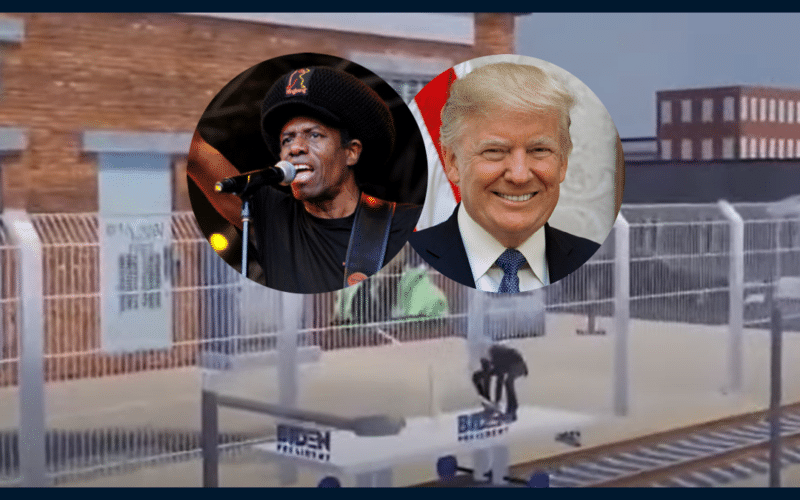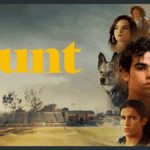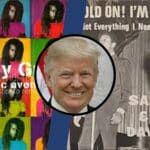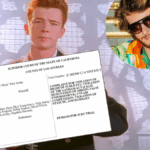Trump’s fair use argument fails as the musician wins a copyright battle over the unlicensed use of “Electric Avenue” in a viral video from the 2020 campaign.
BREAKING: After four years of litigation between musician Eddy Grant and former President Donald Trump, Southern District of New York Judge John G. Koeltl has granted summary judgment in favor of Grant, finding Trump and his 2020 presidential campaign liable for copyright infringement (read the opinion here).
As I’ve previously discussed (here, here, and here), the case involves the unauthorized use of Grant’s iconic 1983 song “Electric Avenue” in a political video shared on Trump’s Twitter account. The video portrayed a red “Trump-Pence” train speeding ahead of a handcar operated by an animated likeness of then-candidate Joe Biden. “Electric Avenue” played during most of the video, unaltered and easily recognizable. Despite a cease-and-desist letter from Grant, the video remained online, amassing millions of views before Grant filed his lawsuit.
In today’s ruling, Judge Koeltl delivered two key decisions. First, he rejected the Trump campaign’s argument that a copyright in the “Electric Avenue” sound recording wasn’t validly registered at the time of the video’s release, finding that a 2002 registration of a greatest hits compilation covered the recording. Second, he rejected Trump’s fair use defense as a matter of law.
No Fair Use
The Trump campaign’s primary defense was that the video’s use of “Electric Avenue” constituted political satire and commentary, therefore qualifying as fair use under the Copyright Act. As I predicted four years ago, Judge Koeltl disagreed, ruling that all four fair use factors weighed in Grant’s favor.
Purpose and Character of the Use
The court held that the use of Grant’s song in the video was not transformative, noting that the video did not alter or comment on “Electric Avenue,” but instead used the song solely for its entertainment value in promoting the Trump campaign. Judge Koeltl described the video as “wholesale copying of music” and the judge highlighted that the song was “immediately recognizable” and unedited, which weighed heavily against fair use. The court also found that “the video’s overarching political purpose does not automatically render its use of any non-political work transformative.” Judge Koeltl added that holding otherwise “would swallow the copyright owner’s exclusive right to prepare derivative works.”
While the song wasn’t used for profit, the court cited last week’s Second Circuit opinion in Hachette Book Group, Inc. v. Internet Archive for the proposition that the lack of a commercial purpose isn’t enough to overcome the lack of a “transformative use.”
Nature of the Copyrighted Work
Judge Koeltl acknowledged that “Electric Avenue” is a creative work, placing it at “the core of intended copyright protection.” Given that creative works receive stronger copyright protection, this factor also favored Grant.
Amount and Substantiality of the Use
The court likewise found that the campaign used a significant portion of Grant’s song, noting that the song plays for more than two-thirds of the animation. Judge Koeltl observed that this portion played a central role in the video, further weakening the campaign’s fair use argument.
Effect on the Market
Finally, in addressing potential market harm, Judge Koeltl ruled that widespread, uncompensated use of Grant’s music in promotional videos—political or otherwise—would undermine his ability to license the song. The court emphasized the existence of a robust music licensing market that the Trump campaign bypassed. The judge further noted that there was “no public benefit” from the use of “Electric Avenue,” stating that the campaign “could have used any song, created a new song, or used no song at all, to convey the same political message.”
The Bottom Line
With liability established, the case will now focus on determining damages. Regardless of the financial outcome, the ruling sends a strong message to political campaigns about the consequences of infringing on intellectual property rights and serves as a strong affirmation of artists’ rights to control how their creative works are used, even in the politically charged context of election campaigns.
The court’s ruling is below. As always, let me know what you think in the comments below or @copyrightlately on social media.
View Fullscreen






2 comments
I thought this was a tough fair use argument to prevail on, but it seems at least the best argument (but not likely a winning one) was never really made at either the MTD or MSJ stages. I think whoever put this together liked that song because the lyric that prominently plays when the song is potted up is “out on the streets there is violence and a lot of work to be done.” Clearly that was part of the message here: during the summer of 2020, there were numerous riots, etc., so by using that particular song and that particular lyric, the point was to say “it is a violent, dangerous country right now – do you want this powerful freight train or this babbling hand cart running the country.” So, maybe not a winner, but at least that is the strongest “I wasn’t using the song because it is a good song with entertainment value, I used it for the particular message it conveyed and how that message drew attention to an important political statement.” Does not appear that ever got argued in that way, which, as I said, I think was the only hope. Damages will be interesting – gonna max out at $150,000, but I think a good faith fair use belief can get you out of willfulness. We’ll see.
Definitely wasn’t argued that way. From the motion to dismiss four years ago:
“Plaintiffs’ allegations imply a deeper meaning to the Song, supported by the lyrics of the snippet used in the Animation: ‘[n]ow in the street, there is violence… And a lots of work to be done.’ These lyrics, however, stand in stark juxtaposition to the comedic nature of the animated caricature of Former VP Biden, squatting and pumping a handcar with a sign that says, ‘Your Hair Smells Terrific,’ and to the excerpt of the overlayed speech that references ‘hairy legs’ and kids playing with his leg hair. Obviously, Mr. Grant’s purpose of creating a meaningful song for the pop music market is completely different from the Animation creator’s purpose of using the song ‘to denigrate … Former Vice President Joseph Biden.”